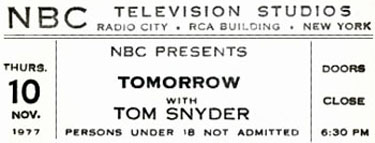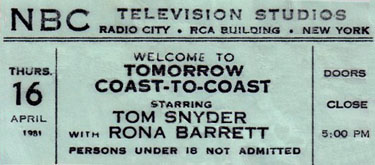Tomorrow


In 1973, looking to expand revenues, NBC decided to stop signing off after Johnny Carson was over at 1 AM. Into the 1:00-2:00 AM time slot, they introduced Tomorrow, an interview show hosted by veteran newsman Tom Snyder. At the time, Snyder was the anchor of the local evening news program at the NBC affiliate in Los Angeles and garnering attention for his work there. (He was the last “single” anchorman in a major market. After him, it was all what the trade calls “boy-girl teams.”)
Tomorrow, at least in its first version, was a simple, low-budget interview show that often managed extraordinary guest bookings. People remember the nights that Snyder quizzed a John Lennon or a Charles Manson, but the guest list was always interesting…and if it wasn’t, the host had a way of making it interesting. When the guests were headline makers, there were occasional jurisdictional disputes within the network. During the Watergate controversy, several prominent figures would agree to be quizzed by Snyder, and NBC’s news division would object, insisting that protocol demanded that the interviewee appear instead with John Chancellor, who was then NBC’s main anchor. At least one or two “hot” guests managed to not appear at all while such disputes were being thrashed out.
But it wasn’t just the guests. Snyder opened each Tomorrow by chatting about whatever was on his mind, often displaying uncommon candor about what was going on in his life or on the network. These segments, along with his distinctive interviewing style, were often lampooned, especially on Saturday Night Live where Dan Aykroyd parodied Snyder with such precision (and frequency) that some observers felt it moved beyond satire and into animosity. Snyder would later complain, with some justification, that NBC execs who didn’t watch his show came to assume it had all the flaws and excesses of the Aykroyd spoof.
Tomorrow, which ping-ponged between Los Angeles and New York over its run, was usually done without a live audience but from time to time, when the guests were entertainers, that would change. (During the years the program was based in Burbank, it usually inhabited Studio 1, taping after Carson and his crew had left for the night.)
For years, it was a happy combo: 90 minutes of The Tonight Show Starring Johnny Carson, followed by 60 minutes of Tomorrow. Then in 1980, Mr. Carson decided to shave his show by one-third. At the time, an hour and a half was the standard length of a talk show and Johnny’s seemed unsatisfyingly short at first. But 60 minutes would come to seem natural for The Tonight Show and it’s now the standard length for all such programs. The only downside of Johnny’s decision turned out to be what happened to Tom Snyder’s program. NBC briefly discussed coming up with a new 30-minute comedy news show to fill the gap but finally decided to merely expand Tomorrow.
That might have been smart had someone also not decided that it needed to become more of an entertainment show with music and a studio audience, plus a co-host in the person of Rona Barrett. The gossip columnist could not have been a worse choice: She was an awkward, boring interviewer and she did her segments from Hollywood without a studio audience, thereby making her utterly disconnected from the main show Snyder was hosting in New York. Another problem was that Ms. Barrett always insisted that any TV camera only show her face from one specific angle. That hadn’t been a problem when her on-screen career had merely been a series of one minute gossip reports on other shows but a longer segment with her was like staring at a still photo.
She was eventually removed from the proceedings but by that point, it was too late: America had learned to go to bed when Johnny signed off. The Snyder part of the programming wasn’t bad, though ol’ Tom was clearly uncomfy in a format more suited to a stand-up comedian than a newsman. Eventually, it all went away and David Letterman came along. That was in 1982. Thirteen years later, after Letterman had moved to CBS, he brought Snyder back to do the show after him — a show nearly identical to The Tomorrow Show in its original format…the one they shouldn’t have tampered with in the first place. Snyder helmed The Late, Late Show until 1999.
(Thanks to Roy Currlin for one of the above tickets.)






